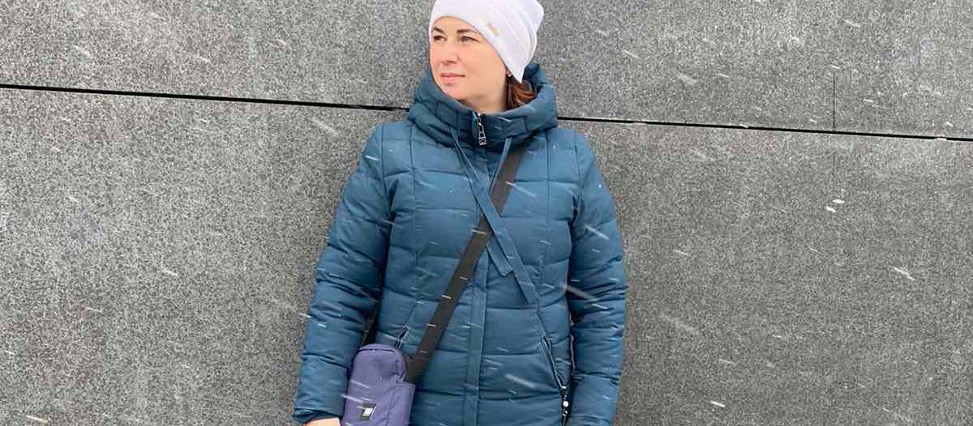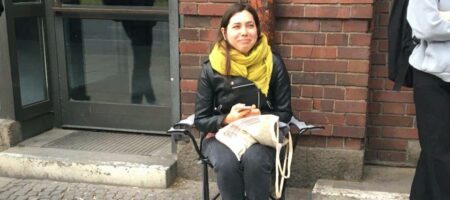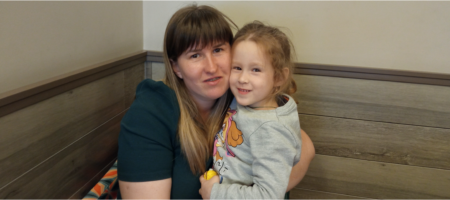Olena is 41 years old. Today she is sitting on a couch in a small one-bedroom flat in Warsaw, which she and four of her family now share. She had a happy life in Kyiv with her family: her husband, their 17 year-old daughter, her mother, her mother-in-law and a lovely little dog named Lilya. Before the war began, Olena had a stable, interesting job organising conferences for medical workers. She was able to travel a lot with work and the family enjoyed spending time together on weekends – visiting the countryside, shopping, sitting down for dinners together and making plans for the future.
Spending time with my family always makes me happy
Everything changed for Olena so unexpectedly. She still finds it impossible to believe. Early one morning, Olena received a call from her cousin.
I didn’t believe what she said. I listened and then just went to go on sleeping, but then I got another from a friend ten minutes later.
Olena and her extended family started to pack things and think about what they could do. They gathered in one flat because they felt they would cope better if they were together. Olena’s mother-in-law also brought her cat.
We just wanted all the family to be together at that time.
They couldn’t manage to leave. It was frightening to move in the streets. The civil cars and buses were being shot at. The bombing was getting louder and the family took shelter in the cellar of the building. They often had to stay there for the whole night. It was freezing cold but quiet and felt safe.
Sometimes we hid in a corridor behind two walls -a protection in case the building was hit by a rocket.
Eventually, a director at Olena’s workplace pushed them to decide to try to leave the country.
She said to me that I should not think long because it’s too dangerous. We should just pack our bags and go.
That’s what they did. They packed minimum belongings and only what they most needed, including the cat and the dog. They put everything in their car and started the trip. It was 24th of March.
We couldn’t leave the animals. They are our family members.
Olena’s husband drove them to the border and then returned to Kyiv. The journey was tough and took two days – without sleep – to reach the border. The roads were overwhelmed by cars also driving away from the conflict. They often sat stationary on the road in traffic for hours. Olena focused on trying to find alternative routes and places to buy food and rest.
Their journey to the border took them through Kyiv, Bila Cerkva, Vinnica and Ternopil – and then around Lviv. Despite being exhausted and frightened the family didn’t want to stop.
We were taking naps in the car in turns because someone should talk to my husband in order not to let him fall asleep.
The name of the border they reached was Smolnica and they crossed it on foot. There were buses available but the crowds of people waiting were huge. It took them more than four hours to walk across the border, stopping at tents when they could for a rest and to seek warmth. The process for checking documents was swift – despite the fact that their pets should have been chipped.
Volunteers met the family once they were within Poland. They took them to a station, provided food and helped them to get warm, but it was hard to find transport for the next stage of the journey. They found the language barrier a big problem, though.
Thanks to my English knowledge we could understand something. If my mom and mother-in-law were without me it would be really hard to cope with all that.
Another difficulty was that they didn’t have any Polish currency.
We were lucky to meet one man named Dmitriy. He is Ukrainian but has been living in Poland for several years. He bought us food, paid for the transport and gave each of us 100 zloty. He was there accidentally; he wasn’t a volunteer. He just saw a Ukrainian family and wanted to help.
Olena’s first plan was to go to Warsaw. During the journey they had called relatives of Olena’s mother-in-law who had invited them to the city. They proposed a separate one room flat for the family where all of them stay now. They pay only communal payments. Their days are taken up with navigating documents and trying to find jobs. They do, however, all feel safe in the country.
When Polish people get to know that I’m Ukrainian they always help and support me.
Olena is very grateful and really amazed about the way they are supported and treated in Poland. She says that even along the streets you see the unity and support everywhere; Ukrainian and Polish flags flying together and discounts for Ukrainians. The Polish treat them in the same way that they would wish to be treated.
Olena mentions that the governmental support program is great: the sums of money aren’t very big but for Ukrainian people during these hard times it is much appreciated.
The situation with jobs is very tough. Olena says that in 80% cases the jobs are for men. She is looking for online work similar to what she had in Kyiv: connected to social media and managing website content.
The family has a great hope that they will be able to return home soon.
In spite of the kind treatment this country isn’t ours. We don’t plan to stay here. We want to go back home….If there is still a home to return to.
Olena is not inspired by the news coming from Ukraine. She and her family continue to plan life and learn more about their new community, Poland and its culture. They are making an effort to get to know people in the neighbourhood, but they are still packing their bags to go home in their minds.
Posted on March 29th, 2022
Voices Ukraine



